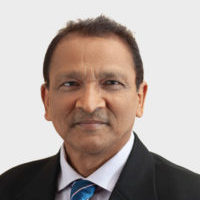by Dr. Kumar Mahabir

Due to their own non-political efforts, Indians in the Diaspora excel in five areas of activity in society: agriculture, engineering, medicine, education and business. Their success evokes more envy than resentment and emulation from the rest of society. Their commercial visibility has made them targets of criminal activity such as home invasions, robberies, violence and kidnappings. In most of the countries in which they have made their homes, they dominate the wholesale and retail trade in grocery, liquor and roti shops as well as jewellery, hardware stores and supermarkets. [The import trade, banking, insurance and finance are monopolised by Whites, Syrians and French-Creoles, who take control of international franchises]. Many Indian retail businesses are now being sold to the new wave of Chinese immigrants, while Indians withdraw to the passive role of landlord, with some of them sending their children to live abroad.
In Jamaica, minority Indians are also visible in horseracing as jockeys and horse owners. In Suriname and Guyana, Indians constitute the elite, richest one percent of the society. Indian businessmen in Guyana own commercial banks, light aircraft, insurance companies, rum distilleries and manufacturing industries, and may well be the richest among their associates in the Caribbean.
The failure of the Indian business class in the Diaspora, however, is that it does not unify itself into a cohesive force, nor has it been able to establish (international) conglomerates (except for Gafoors based in Guyana). Indian business owners do not often convert their family-owned businesses into professionally-run corporations, and have not been able to establish ethnic-based organisations such as The African American Chamber of Commerce, or produce publications like the Black Business Directory. While Indians own some media houses, they have failed to use them to articulate and assert their political views and ethnic identity, even when their own lives and livelihoods are being threatened. In visual advertisements, for example, they have made themselves (Indian males, in particular) voiceless and invisible.
SPEAKERS:
- Vijayakumar Kammar (India) – Director of Global Marketing; 30 years’ experience as a Business Development & Marketing Chief Executive in Forging, Casting and CNC Machining
- Jean-Claude Escalante (Trinidad) – BA in Business Administration from the University of New Brunswick, Canada; author of the book From Indentureship to Entrepreneurship (2021)
- Sattaur Gafoor (Guyana) – Chairman of the Gafoor conglomerate based in Guyana with corporations in Barbados, Grenada and St. Lucia; named in Who’s Who of the World 1999-2000
- Hemraj Ramdath (Canada/Trinidad) – Business Consultant and researcher; spent the past four decades working globally in the energy and FMCG (Fast moving Consumer Goods) sectors
Followed by Q&A
SEE VIDEO RECORDING by touching or clicking on this link:
https://www.facebook.com/watch/?v=492366329263341
Live-streamed on the Facebook page of the Indo-Caribbean Cultural Centre
https://www.facebook.com/indocaribbeanculturalcentre
Hosted by www.indocaribbeanpublications.com & https://ameenagafoorinstitute.org
WhatsApp +1 868 756 4961 or +1 868 381 0386
dmahabir@gmail.com, indocaribbeanstaff@gmail.com,
Please SHARE.

is a full-time anthropologist at the University of Guyana (UG) and Fellow of The Eccles Centre for American Studies, British Library (2022-23). He is a former Assistant Professor at the University of Trinidad and Tobago (UTT). He obtained his Ph.D. in Anthropology from the University of Florida (UF). As a doctoral student, he won a Florida Caribbean Institute Award, an A. Curtis Wilgus Grant, and an Organization of American States (OAS) Fellowship.
Mahabir received a National Award (Hummingbird Silver Medal) for his contribution to education in his country in 2011. He was among 50 recipients who received a Distinguished Alumni Award from the UWI Alumni Association.
Mahabir is the author of 12 books to date.
